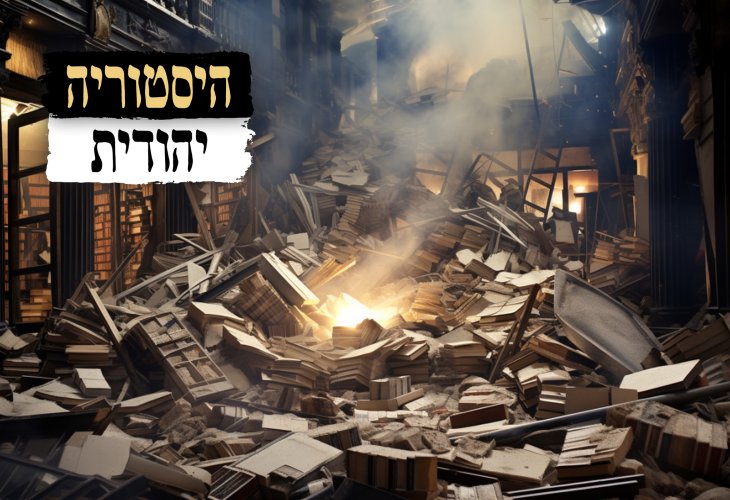A Page from History: The Fate of a Bookstore Destroyed in an Attack
The convoy sped forward. Upon reaching the corner of Ben Yehuda Street and Ben Hillel Street, British soldiers opened fire on passersby. Minutes later, three explosives-laden trucks detonated in the heart of Jewish Jerusalem. One of the stores utterly destroyed was that of R. Michel Rabinowitz.

On the 16th of Cheshvan, 5709, a modest and small notice was posted on the walls of one of the houses in the Sha'arei Chesed neighborhood: "R. Michel Rabinowitz, of blessed memory, passed away yesterday from a heart attack. His three daughters are sitting shiva at his home."
R. Michel Rabinowitz was born in the town of Mir, studied in the yeshivas of Telz and Slabodka, and was ordained as a rabbi at 18, considered a prodigy. After marriage, he moved to Minsk and began trading in books.
In the year 5685, his wife passed away, and he moved with his three daughters to Jerusalem, where he opened a bookstore called "Drom," named after the Talmudic saying: "He who wishes to be wise should go south."
His brother, R. Mordechai Leib, was the head of the Beit Din of the Haredi community in Jerusalem (the father-in-law of Rabbi Raphael Katzenelnbogen, a rabbi of the Haredi community in Jerusalem). But R. Michel chose to make his living by selling books and engaging with scholars who loved to visit bookstores and purchase new works... Visitors would sit on a stone step that crossed the store, and R. Michel would say, "On this step sat all the scholars of Israel."
One of the famous writers in Jerusalem described him: "R. Michel Rabinowitz, of blessed memory, was an exceptional scholar and knowledgeable in every room of Torah; there was no matter of Torah in which he was not involved. Old and new books were always open before him, at all times. Out of love for Torah, he engaged with every innovation a true student made, and he also innovated Torah thoughts but never committed them to writing."
The store thrived and blossomed; scholars and learners gathered there, and R. Michel would actively take part in their discussions, telling them about exceptional prodigies he met in Telz, Slabodka, and Minsk. Some of them documented these accounts.
On the 12th of Adar, 5708, during the height of Israel's War of Independence, at 6:30 in the morning, a convoy of three trucks accompanied by a British army armored vehicle arrived at Ben Yehuda Street in Jerusalem. Members of the Haganah, who were on guard, asked the British soldiers driving the convoy what was happening. They replied that it was waste removal destined for Allenby Camp and refused inspection. As the guards were considering their next move, the convoy sped forward.
Upon reaching the corner of Ben Yehuda Street and Ben Hillel Street, the British soldiers abandoned the trucks, opened fire on passersby, and fled in the British armored vehicle. Minutes later, three explosives-laden trucks detonated in the heart of Jewish Jerusalem. Several four-story buildings collapsed entirely, causing massive damage to the entire area.
Clearing the rubble took about 36 hours, at the end of which more than 140 were injured, and 49 were confirmed dead. Mount of Olives was cut off by Arabs from the Jewish settlement, and a new cemetery was hastily established: the Sanhedria cemetery, which was then at the city's edge. On the 16th of Adar, most of the victims were buried in a mass grave.
The British army disclaimed responsibility, stating that the soldiers who carried out the attack were deserters.
One of the stores utterly destroyed was R. Michel Rabinowitz's store, "Drom."
R. Michel wandered through the ruins, trying to salvage fragments of pages from the great treasures that were stored in his shop—rare and unique editions, ancient books of great value, and more... But it was clear he could not restore his life's work. Deeply sorrowed, R. Michel withered until, several months later, he suffered a heart attack, collapsed and passed away.

